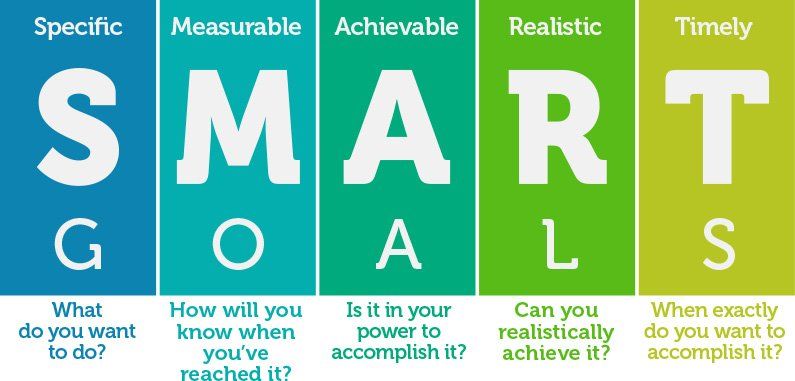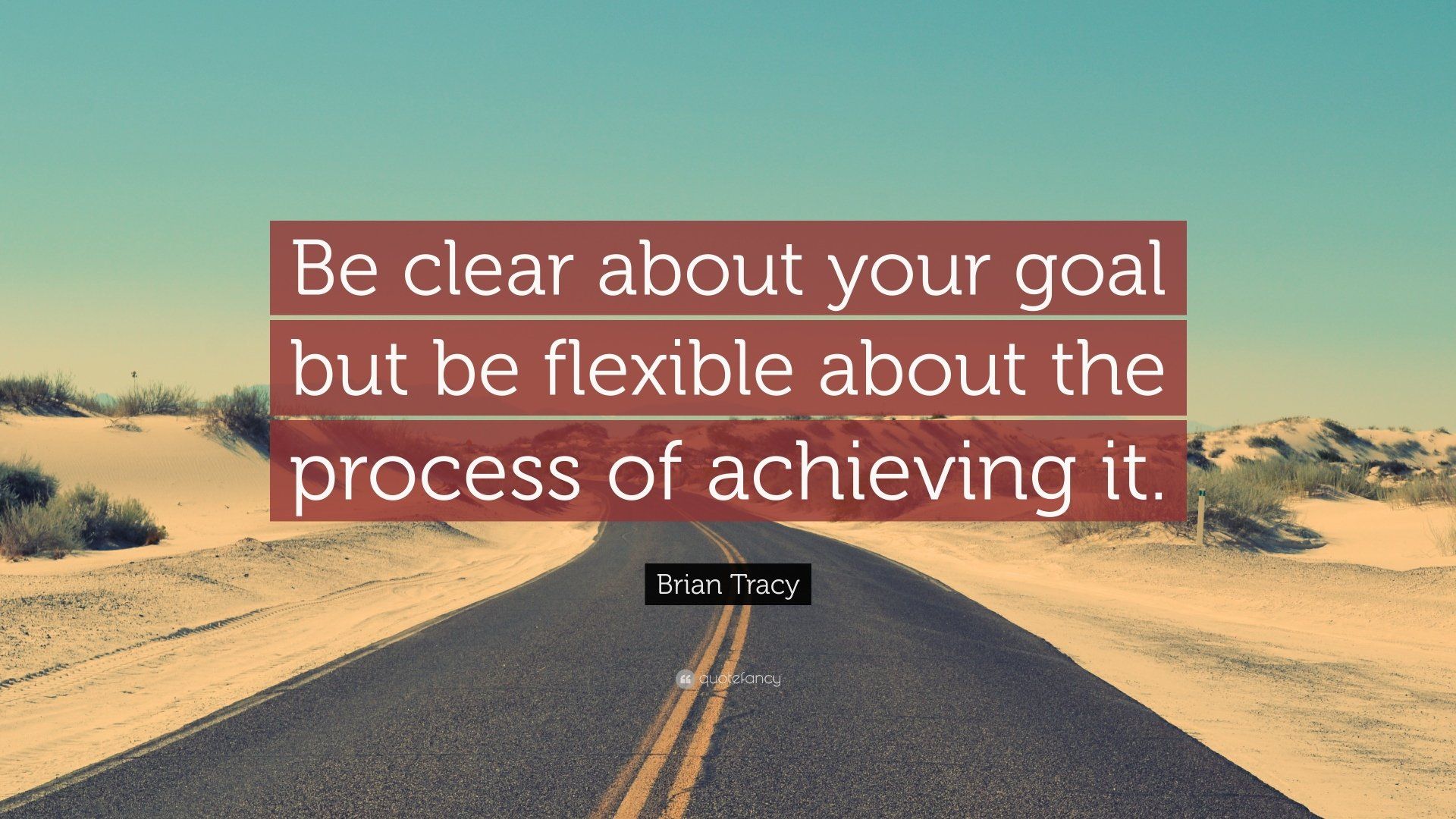

"How to Set Goals You'll
Actually Achieve"
- Specific - What precisely do you want to do?
- Measurable - How will you know if you’ve been successful? What are the milestones for attaining the goal?
- Achievable - Do you have the right skills, tools, resources, etc. needed to accomplish your goal?
- Realistic or Relevant - Is it the right time? Can this goal be reasonably achieved?
- Time Bound - What is the timeline for accomplishing your goal?

How to use the SMART process for achieving your goals:
Each component of the SMART methodology works in its own way to create goals that are well-planned, concise, and trackable. This process provides an action-oriented methodology for achieving goals repeatedly over time. Plus, it works whether you're working on a professional or a personal goal.
1. Specific
The key here is to be clear and specific. When your goals are too vague, it becomes difficult to know where to start, and/or in what order to go about the steps. This leads to inertia and frustration. To avoid this, use the questions below to guide your thinking as you craft your goal:
- What do I want to accomplish?
- Why is this goal important to me?
- Where do I need to be in order to do it?
- Who else is involved?
- What other resources or skills are required?
Example: For nearly a decade, I've had the vague goal to write a blog, which I was able to consistently
not achieve for more years than I care to admit. But once I transformed this goal into a SMART goal, what I needed to do to begin became immediately clear. Instead of “Write a blog,” my goal became “I will write a blog about productivity, creativity, and habit formation using source material from my class so that I can create a compendium of useful articles that provide the groundwork for a future career of coaching and paid speaking opportunities.” Then, knowing what I wanted to do and why, I could make progress and move to the next step:

2. Measurable
What evidence or milestones will signal that you are making progress towards your goal? Measuring your progress helps you stay on track and stay motivated. Moreover, by breaking your goal down into component pieces and measuring your progress as you go, you create forward momentum for yourself and can more tangibly see yourself getting closer to your goal.
Example: Instead of wishing that I would sit down and write an article, I changed my goal to “Write one new article every two weeks and publish it on my blog.” From there, I broke that down further to schedule time to research topics and edit the articles, which helped me organize my weekly schedule to hit my mark.
3. Achievable
Next, your goal needs to be achievable. When we subscribe to the “Go Big or Go Home” mentality for goal setting, it becomes de-motivating. “Write a blog” is a huge goal. Daunting. Which is why it stayed stuck in neutral for so many years. Once I broke it down into its component parts and made it achievable, only then did I start to make progress.
The key was making sure that the weekly actions towards my goal stretched my abilities, but still fit into my existing world of responsibilities and commitments. Writing one article every other week fit into my current life and schedule. Trying to do more than that made me feel stressed, because that wasn't possible for me. That created anxiety. And that anxiety prevented me from ever starting to write.
"If you never fail, you’re only trying things that are too easy
and playing far below your level... If you can’t remember any
time in the last six months when you failed, you aren’t trying
to do difficult enough things."
- Eliezer Yudkowsky
Achievable goals typically answer one or both of the following questions:
- How will I accomplish this goal?
- How realistic is the goal given my other constraints (e.g. time, money, or skill set)?
Example: For me, writing the blog required me to evaluate my other commitments and to change my routine in order to fit writing into my weekly schedule. Moreover, I also realized that I needed an external force to keep me accountable. In this case, I’ve hired an editor who has assumed the role of holding me accountable to hitting my writing deadlines.
Additionally, since writing a blog is the first step in a long road towards a change in my work and lifestyle, my wife and I shifted around our finances in order to ensure we were covered until I could generate income from the blog or speaking engagements
4. Realistic or Relevant
Making sure your goal is relevant and aligned with where you want to go is key. Often, we add goals without considering the other parts of our lives and our existing commitments. It's critical to make sure that this goal fits with your existing efforts and time available. Otherwise, you are setting yourself up for frustration and failure.
If your goal fits into your life and complements or enhances your current efforts, it’s relevant. If not, you may want to reconsider. In addition, sometimes the timing is off for a certain type of goal, or you may not have access to the right people or the required skills to complete it. Some questions to ask yourself to make sure your goal is both realistic and relevant include:
- Is this goal aligned with where I am trying to go?
- Is now the best time to begin the process of achieving this goal?
- Do I have access to the right people to accomplish this goal?
- Do I have the right motivation and desire required to see this process through to the end?
Example: Prior to teaching my course "Entrepreneurial Endurance," writing a blog was not a relevant goal for my life. Instead, it was simply one more thing to do on top of an already overflowing schedule. Since writing wasn’t synergistic with my other career goals, even
thinking about doing it stressed me out. However, once I launched my course, writing articles became another way for me to approach the material. Writing allowed me to think about my topics differently, and work through how I'd want to teach them.
Therefore, writing blogs now enhances my efforts around Coaching and Blogging, and therefore contributes to where I want to be headed in my life. It also required me to set down one of my roles. To do so, I left my startup in order to free up the necessary time to devote to writing.
5. Time-bound:
The last and most important step in achieving your goal is setting a target date for completion. Having milestones and deadlines to work toward provides added motivation as well as prevents your day-to-day tasks from overwhelming your longer-term ones. Key questions to ask yourself include:
- By what date will this goal be completed?
- What can I do right now to move forward?
- What can I do in the next thirty days to move forward?
- What can I do in the next three to six months to move forward?
Example: I had to break down the goal of writing a blog into its component parts, sequence them, and then begin. My goal was to launch the blog during my class this past Fall. Next, I found myself an accountability partner. We collaborated on the steps required to design and launch the blog. Next, I began researching and writing in the cadence I had designed for myself. Keep in mind that for some goals, you may need to consider additional training needs and/or the time needed to acquire new skills. Most importantly, setting a realistic timeline for achieving the steps required to achieve your goal will help keep you motivated as you progress.

Conclusion
Taking the time to think through the entire life cycle of your goals will vastly increase your odds of achieving them. Following the SMART criteria requires you to get granular. You'll have to think through the steps to achieve your goal and identify the people, resources, and/or skills you may need to acquire along the way. This investment in time to think about your goals is the difference between success and failure.
You may find that in order to accomplish your goal, you'll need to let go of other commitments. Letting go of something can be difficult, especially if it's been a part of your life for a while, and
especially if it's something that makes you significant or reliable income. In my case, I knew that teaching was a passion of mine that I wasn’t willing to let go. When I realized that blogging makes me a better teacher, it became intrinsically motivating. However, writing consistently required more time than I had available, which led to the difficult decision to step back from my startup.
Another benefit of the SMART process is that it builds in flexibility to an otherwise rigid process. Allowing for flexibility decreases the likelihood that you’ll get discouraged when things don’t go according to plan, or when life serves up something unexpected.
As I embarked on the journey of creating a blog, I realized that there were a lot more steps required for a successful launch than I had initially pictured: creating website photography, writing a sufficient number of articles to launch with, and most importantly, an editor. Now, with these pieces in place, the blog has launched. I’m writing first thing in the morning every weekday, which allows me to be a present father on the weekends. SMART helped me get to this point, and has helped keep me on the path to achieving my goal. It can do the same for you!
